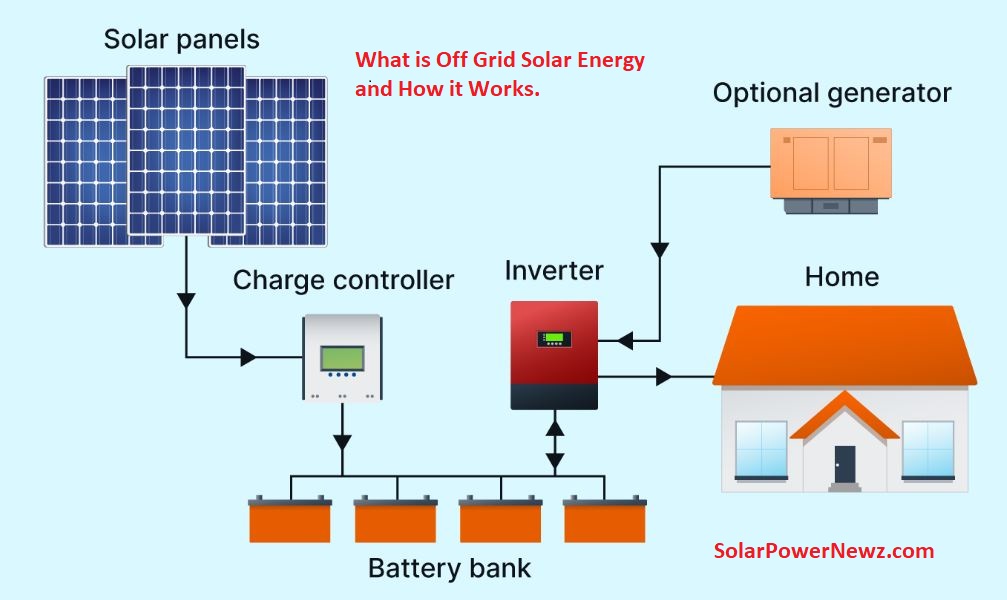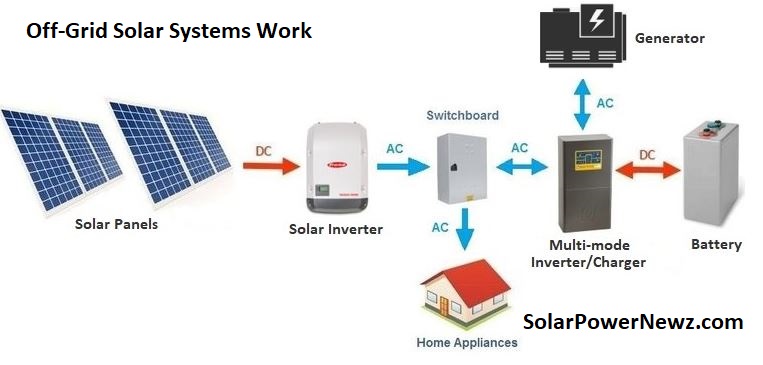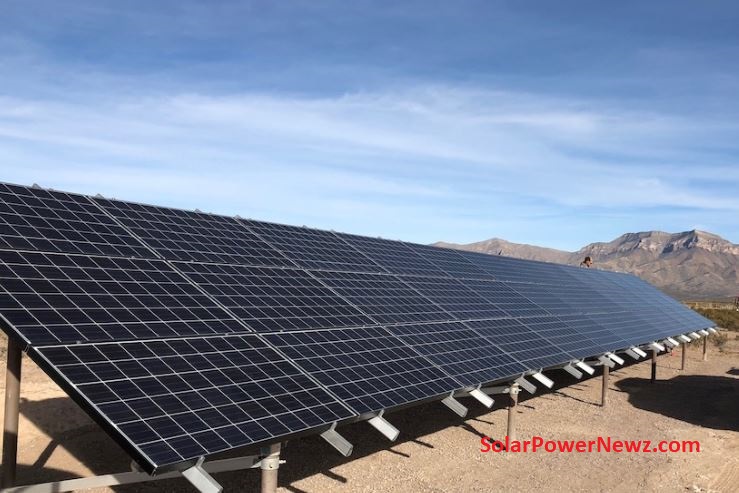What is Off Grid Solar Energy and How it Works
One of the most popular varieties of solar power systems is off-grid solar power, commonly known as stand-alone power systems (SAPS). It works by producing electricity from solar panels, which is then channelled through a charger controller to recharge a solar battery.
What Off Grid Solar Energy Is and How It Operates will be covered in this article.
To power the appliances in a home or office, an inverter converts the electricity. Solar energy can be used to power a home even at night or during periods of lower solar exposure by storing electricity in a solar battery.
Table of Contents
What exactly is off-grid solar energy
Medium- to large-sized residences can have their electrical demands met by an off-grid solar system. Off-grid solar systems, in contrast to grid-connected solar systems, lack access to the utility grid and must produce all of the electricity required to power your home.

Continue reading if you still have questions about off-grid solar power. Off-grid solar systems are powered by energy that is kept in a battery bank, to provide you the quick answer. Power produced by solar panels is used to replenish the battery bank. Your off-grid solar system must be appropriately designed to supply all of your daily energy requirements as well as to replenish the battery bank’s stored energy.
How Off-Grid Solar Systems Work
A battery bank is used in Off Grid Solar Energy to store all of the electricity generated and to provide electricity when it is needed. Regardless of how much solar energy is consumed, batteries are always charged. Adding a battery to an off-grid system, on the other hand, raises the cost, which is one of the primary reasons why consumers prefer a grid-connected solar power system.

Off-grid solar systems produce electricity independently without utilising the power grid. They function by gathering solar energy and transforming it into electricity that can be utilised to run electronics and appliances in the home. Solar panels, a charge controller, a battery bank, an inverter, and a generator serving as a backup power source are the fundamental parts of an off-grid solar system. Direct current (DC) electricity is generated by solar panels and stored in battery banks after being controlled by a charge controller. The inverter transforms the stored direct current (DC) electricity into alternating current (AC), which is used to power home electronics and appliances. The generator serves as a backup power source in case the battery bank runs out of power or there’s a power outage. Power distribution panel will distribute the solar energy to the different loads. The capacity of the battery bank and the generator determine the reliability and length of time that the system can provide power. Regular maintenance and battery replacement is important to ensure that the system is operating efficiently.
Benefits of Off-Grid Solar System
People who live off the grid can now get power thanks to technological advancements and resourcefulness. When grid connectivity is unavailable, off-grid solar systems are chosen. Here are a few of their additional benefits:
- You won’t have to worry about power outages at home if you move off the grid.
- Off-grid power solutions are best suited for locations where grid connectivity is unavailable due to topography. Off-grid solar energy systems are the best alternative for ensuring a consistent supply of electricity in remote and high-altitude sites. Install off-grid Solar Power in Nexus Energy.
- Using off-grid renewable energy minimises your reliance on finite resources like fossil fuels, which get more expensive as they deplete, as well as your need to pay for electricity.
- Total energy independence from external sources: You can be entirely self-sufficient in terms of energy with an off-grid option.
Types of Off-Grid Solar Power Systems
There are various sorts of off-grid solar systems to choose from when it comes to solar electricity for off-grid living. The following use AC or DC system power in various configurations:
Off-Grid DC Solar Energy Systems
Off-grid solar power systems are most typically utilised when utility power is unavailable to power DC equipment in RVs, boats, and cabins, as well as farm/ranch appliances such as livestock gates and rural telecommunications systems.

DC solar power is less expensive than AC solar power since an inverter is not required to convert the electricity generated by solar panels and stored in batteries from DC to AC.
Off-Grid AC Solar Power Systems
Batteries are also used in off-grid solar power to store DC electricity. With the addition of an inverter, this system may convert DC electrical current from the batteries to AC, or alternating current. The suitable current for conventional household equipment is alternating current (AC), which is the standard form of energy for anything that “plugs in” to utility power.
Components Required for Off-Grid Solar Energy Systems
In addition to solar panels and structural balancing, an off-grid solar energy system requires.
Battery bank:
A battery bank is just a cluster of batteries wired together to a large power source. If you do not have a battery bank, there will be no electricity to operate your home at night. This is what increases the price of an off-grid solar system.
Solar Inverters:
A solar inverter, also known as a solar converter or a PV inverter, is required in solar power systems to convert the direct current (DC) generated by solar panel arrays into alternating current (AC) for powering most common household appliances and gadgets. For off-grid installations, use a stand-alone inverter.
Solar Charge Controller:
A solar charge controller or battery charger is required to save the battery. The controller controls the voltage and current sent to the solar battery to prevent overcharging and damage.
DC Disconnect Switch:
For off-grid solar systems, an additional DC disconnect switch is installed between the battery bank and the off-grid inverter. It is used to prevent current from flowing between these components. This is required for routine maintenance, troubleshooting, and fire prevention.
Off-Grid Solar Energy Systems advantages and disadvantages
Off-grid solar energy systems have a number of advantages and disadvantages. Some of the main advantages include:
advantages
- Independence from the power grid: Off-grid solutions enable users to produce their own electricity, which can be especially helpful in distant or rural places where access to the conventional power grid is difficult or expensive.
- Reliability: An off-grid solution will enable users to maintain electricity in the event of a power outage or natural disaster.
- Savings: Over time, purchasing an off-grid solar system may be less expensive than purchasing electricity from the grid.
- Environmentally friendly: There are no greenhouse gas emissions from the production of solar energy, which is a clean, renewable source of electricity.
- Energy security: off-grid solar energy system do not rely on electricity from the grid, which can be vulnerable to natural disaster, cyber attacks or other events that might disrupt the power supply.
disadvantages
- High upfront costs: Setting up an off-grid solar system can be pricey, especially if battery storage is needed.
- The capacity of an off-grid system is typically constrained by the capacity of the batteries, thus it might not be enough to power all of your appliances.
- Maintenance: In order to keep off-grid devices running as efficiently as possible, routine maintenance is necessary, and batteries must occasionally be changed.
- Energy storage: It is crucial to properly maintain and store the battery, which could raise the system’s cost.
- Dependence on climate: The system’s performance is affected by the regional climate, including how much sun there is, how cold or hot it is, and other factors.
- Intermittency: Unlike grid-tied system, off-grid systems does not have grid as a backup, so during night or when there’s no sunlight for a period of time, you won’t have electricity.
FAQs
What are the solar panels’ primary uses in an off-grid system?
To generate direct current (DC) electricity from sunlight.
In an off-grid system, what is regulated by the charge controller?
In addition to preventing overcharging, it controls how much electricity is sent from the solar panels to the battery bank.
What purpose does a battery bank serve in an off-grid system?
For use when the sun isn’t shining, it stores the DC electricity produced by the solar panels.
How does an off-grid system’s inverter work?
In order to power home appliances, it changes the direct current (DC) electricity housed in the battery bank into alternating current (AC) electricity.
How does an off-grid system’s inverter work?
In order to power home appliances, it changes the direct current (DC) electricity housed in the battery bank into alternating current (AC) electricity.
What function does the generator serve in a solar off-grid system?
In the event that the battery bank runs out of juice or there is a power outage, it acts as a backup power source.
Why do remote or rural locations benefit from off-grid solar power systems?
They enable users to produce their own electricity, which can be especially helpful in isolated or rural places with expensive or restricted connection to the regular power system.
How much more expensive are off-grid solar systems than grid-tied systems over time?
Off-grid solar power systems could be less expensive in the long run than grid-tied electricity.
What advantages does using an off-grid solar system have for the environment?
A clean, renewable energy source that doesn’t emit any greenhouse gases is solar energy.
What possible problems might an off-grid solar system have?
high initial expenses, capacity limitations, ongoing maintenance, and energy storage.
What aspects need to be taken into account prior to establishing an off-grid solar system?
the cost, energy requirements, and upkeep in the area.
Can grid-tied solar power systems be utilised in conjunction with off-grid ones?
To boost dependability and redundancy, hybrid systems—which combine off-grid and grid-tied technologies—can be put into use.
Can off-grid solutions be used in commercial buildings?
Business buildings can use off-grid solar electricity, although these systems frequently require more capacity and advanced equipment.